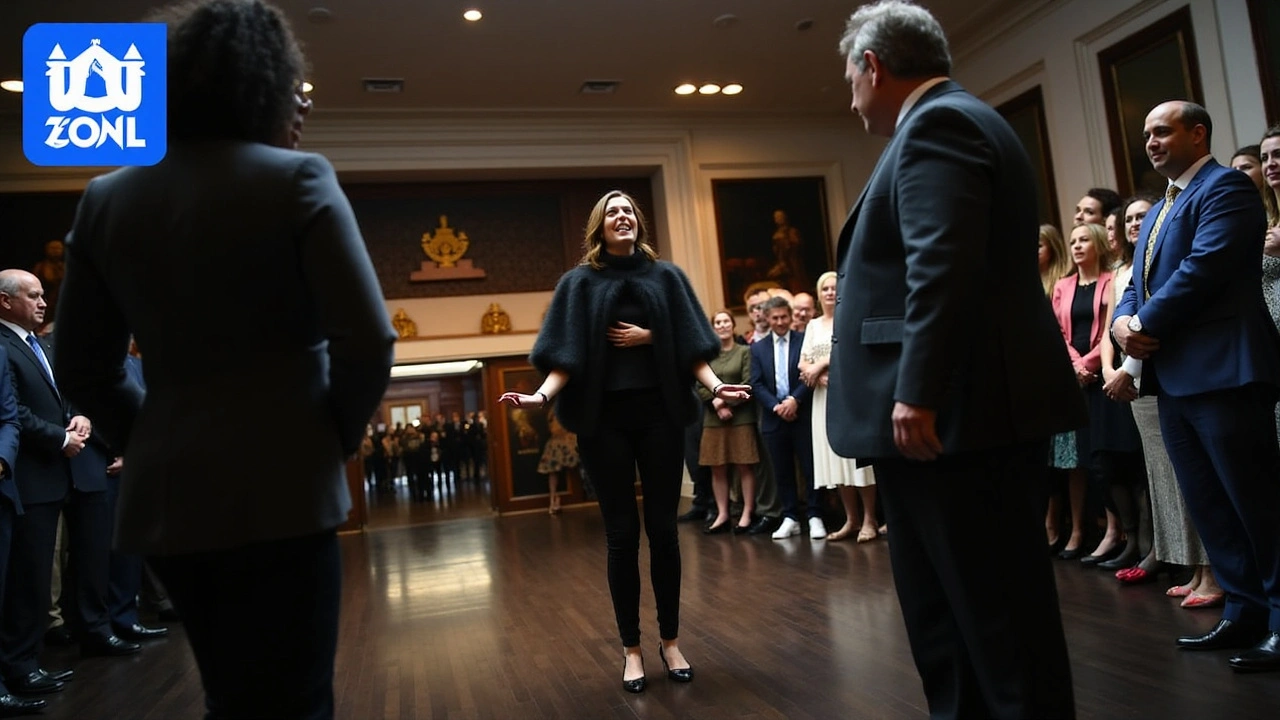In a dramatic display that captured the nation’s attention, Independent Senator Lidia Thorpe brought her activism directly to a royal audience at Parliament House, Canberra, during a visit by King Charles and Queen Camilla. Her act of defiance was a call for the acknowledgment of Indigenous Australian rights. With a backdrop of finely dressed dignitaries and political leaders like Prime Minister Anthony Albanese and Opposition Leader Peter Dutton, Thorpe's outburst was startling, yet it resonated with deep historical tensions.
Protest at the Heart of Power
Clad in a fur cloak symbolizing her heritage as a representative of the Gunnai, Gunditjmara, and Djab Wurrung peoples, Senator Thorpe's protest underscored a forceful reminder of the unresolved issues surrounding Australia's colonial history. Her words, “You are not our king,” echoed through the halls as she demanded a treaty and highlighted the ongoing impact of colonialism. In a moment charged with emotion, she accused the British monarchy of genocide, calling for the return of what she described as stolen lands and the remains of Indigenous ancestors.
The optics of this confrontation were striking. The setting – a formal reception within the government’s cornerstone – underscored the jarring contrast between ceremonial pomp and unresolved historical grievances. While such protests are not unusual outside the legislative chambers, Thorpe’s decision to confront the British royals so directly injected a new dynamic into Australia’s relationship with its past and its colonial links.
A Day of Activism
This wasn’t Thorpe's only act of dissent that day. Earlier, at the Australian War Memorial, she joined other protesters in a parallel demonstration aiming to draw attention to the struggles of Indigenous Australians. These actions came alongside a symbolic gesture at the reception where she notably turned her back during the Australian national anthem, a move which, in itself, speaks volumes about her stance and advocacy.
Senator Thorpe later clarified that her demonstration aimed to present King Charles with a “notice of complicity in Aboriginal Genocide,” referencing the Statute of the International Criminal Court from 1998. This act bore a profound symbolism aimed at reminding the monarchy of its historical debts to the Indigenous people of Australia.
Reactions and Calls for Accountability
The incident did not pass without comment or controversy. The Australian Monarchist League’s national chairman, Philip Benwell, was quick to demand Thorpe's resignation, labeling her actions as a “childish demonstration.” The royal reception, supposed to be a day of diplomatic exchanges and ceremony, became instead a stage for larger debates over Australia’s colonial legacy and its treatment of Indigenous communities.
Opinions are polarized. On the one hand, supporters see Thorpe’s protest as a courageous act of advocacy for Indigenous rights. They argue that her actions shine a necessary spotlight on issues that are often glossed over in dialogues dominated by ceremonious gestures. On the other hand, her detractors point to the disruption of diplomatic protocols and the perceived disrespect towards visiting dignitaries as undermining her cause. Yet, for many Indigenous activists, this was precisely the point – to disrupt the norm and demand attention to ongoing injustices.
The Broader Context
This event did not occur in isolation. It is part of a broader movement within Australia to address historical wrongs faced by Indigenous communities. Calls for a treaty, recognition of land rights, and reparations are gaining traction, especially as the country reckons with its colonial past. Thorpe's actions at the parliament echo a persistent narrative woven into the fabric of Australian activism – a search for justice and acknowledgment.
The presence of the British royals added a global dimension to these discussions. As Australia navigates its place within the Commonwealth, conversations about its future, including calls for republicanism, are intertwined with the question of how to heal and move forward from its historically painful chapters. Thorpe's protest, therefore, was not just about a single demand but an invitation for the nation to engage with its full history, looking candidly at its impacts and responsibilities.
The Road Ahead
As King Charles and Queen Camilla continue their visit, with plans to travel to Sydney the following day, the responses to Thorpe's protest serve as a microcosm of Australia's current cultural and political climate. While the immediate aftermath may involve discussions on decorum and diplomatic behavior, the underpinning issues highlighted by Thorpe's action demand a deeper, sustained dialogue.
The quest for a treaty and reconciliation with Indigenous Australians necessitates more than words or symbolic gestures. It requires genuine acknowledgment and policy-driven commitments that reflect the needs and voices of Indigenous communities. Thorpe's call for the return of stolen lands and recognition of past wrongs is not solely a radical assertion – it is a microcosm of a broader call for justice echoed by many across the nation.
In light of this, Australia's leaders, alongside its citizenry, are confronted with the challenge of addressing these concerns not just through fleeting diplomatic engagements, but with sustained and meaningful action. The symbolic protests seen at these high-profile events might compel deeper reflection and potential action for change. As the nation continues to grapple with these complex issues, the voices of advocates like Thorpe will likely remain an essential part of the conversation towards achieving genuine, lasting reconciliation.

Write a comment